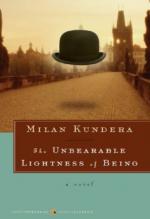|
This section contains 3,676 words (approx. 13 pages at 300 words per page) |

|
SOURCE: “Fictive Lightness, Fictive Weight,” in Salmagundi, No. 73, Winter, 1987, pp. 84-92.
In the following essay, Bayley examines the dialectical structure, moral and political themes, and narrative strategy of The Unbearable Lightness of Being.
Like most novelists of the present time Kundera is a theorist of his art, not only weaving ideas about it into the texture of the fiction he is inventing, but making the invention itself, and the characters produced by it, determined by his conception of where fiction can end and begin. From a casual sentence or two when we are getting on towards the end of The Unbearable Lightness of Being we discover that the hero and heroine (conventional terms which carry an unusual emphasis in this novel) were (or are to be) killed in a driving accident shortly after the novel ends.
The confusion of tenses—were they killed, or are they to be...
|
This section contains 3,676 words (approx. 13 pages at 300 words per page) |

|


